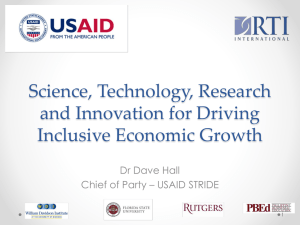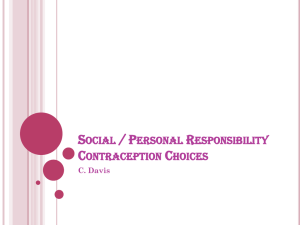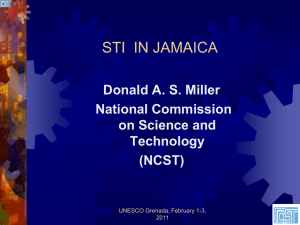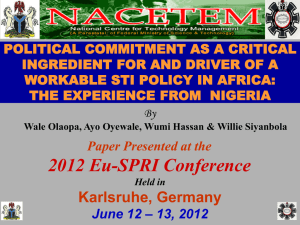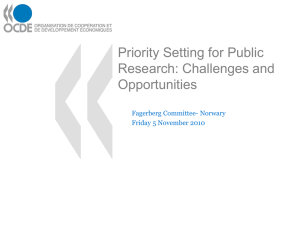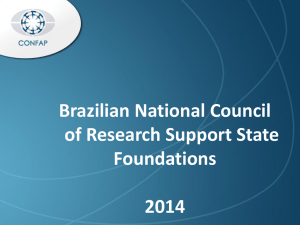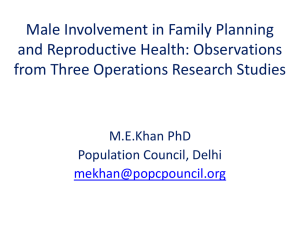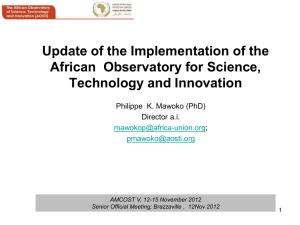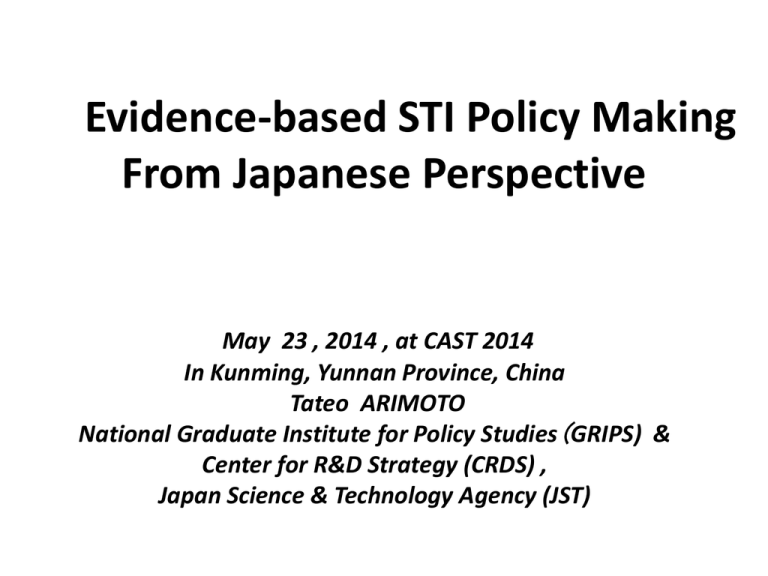
Evidence-based STI Policy Making
From Japanese Perspective
May 23 , 2014 , at CAST 2014
In Kunming, Yunnan Province, China
Tateo ARIMOTO
National Graduate Institute for Policy Studies(GRIPS) &
Center for R&D Strategy (CRDS) ,
Japan Science & Technology Agency (JST)
Contents
1.
2.
3.
4.
Great Transformation of Global System
Reshaping STI Policy and System
Japan’s Science of STI Policy Program
Conclusion
Since 1989
Great Transformation
Now 2014
End of the Cold-War
ICT revolution
“Globalization,
Complexity & Uncertainty”
Disasters
・Sustainable development
・Climate change, Energy &
Natural resources
・Water, Health,Food, Biodiversity
・Natural/Artificial Disasters
Economic
・Knowledge & Aging society
Crises
Climate
Change
New World
Order
STI & Univ.
Reform
3
Since 1989
Great Transformation
Now 2014
End of the Cold-War
ICT revolution
“Globalization,
Complexity & Uncertainty”
Disasters
・Sustainable development
・Climate change, Energy &
Natural resources
・Water, Health,Food, Biodiversity
・Natural/Artificial Disasters
Economic
・Knowledge & Aging society
Crises
Climate
Change
New World
Order
University
Reform
4
“The Changing Map of Science”
Nature, October 18, 2012
6
The International Landscape of Science Policy Organizations & Fora
Groups of
Research and
Funding agencies
APEC
EC
G8
ASEAN
Carnegie Group( G8+5)
Others
Global meeting of CSAs
ESFRI
Belmont Forum
GRC
(e.g. Ministerial, CSA meetings)
High Level
IGFA
Others
High Level Groups
Regional bodies
Active role
in the governance
International
Organizations
Others
Science
Europe
UN and related bodies
Network,
System of
systems
Institutions for
Policy Research
SPRU
PREST
Rathenau
UN Secretary-General’s
Scientific Advisory Board
NISTEP
RAND
Others
IPCC
UNESCO
OECD
ISSC
Social Science
ICSU
IAC
TWAS
International
Scientific
Unions
NAS
(USA)
IUPAP
Others
IUPAC
IAU
GSF
AAAS
Others
Royal
Society
(UK)
Others
CSTP
Others
National
Members
IAEA
CAST
SBPC
WHO
WMO
FAO
ITU
WIPO
High Level
International Societies/Academies
IAP
Specific
Committees
TIP
NESTI
Others
International
Forums
ESOF
WSF
STS Forum
Others
Inter-governmental and generalpurpose committee for consultations
between government officials, and
between officials and scientists.
S & T and Innovation in the 21st century
○ STI for knowledge
○
○
○
○
○
○
○
STI
STI
STI
STI
STI
STI
STI
for
for
for
for
for
for
for
profit
competitiveness
growth
employment
wellbeing & quality of life
safety, security & social cohesion
sustainability & resilience
Redesigning science & innovation system
Responsible conduct in the R&D enterprise
- locally, nationally, regionally and globally -
8
“The Age of Transformation”
Reshaping S&T policy
WSC 1999 : Budapest Declaration- Science for the 21st century–
”Science for Knowledge“ and
“Science in Society and Science for Society”
OECD 2010 : “The OECD Innovation Strategy”
WSF 2011 : ”The Changing Landscape of Science
- Challenges & Opportunities ”
WSF 2013 : "Science for Global Sustainable Development ”
AAAS 2012 : “Flattening the World Building a Global Knowledge Society”
AAAS 2013 : “The Beauty and Benefits of Science”
AAAS 2014 : “Meeting Global Challenges - Discovery and innovation”
Davos 2012 : "The Great Transformation - Shaping New Models"
Davos 2013 : “Resilient Dynamism”
Davos 2014 : “The Reshaping of the world - Consequences for Society,
Politics and Business”
Rethinking S&T system
Global Research Council : 2012Science, Nov 2011: ”Rethinking the Science System”
Nature, Oct 2012 : “The Changing Map of Science
– Science on the move, Global Research”
IAC 2012 : “Responsible Conduct in the Global Research Enterprise”
ICSU : “Future Earth” 2013EU, Vilnius Declaration 2013 : The Value and Benefits of Integrating
Social Science and Humanities into Horizons 2020”
World Social Science Report 2013 : “Changing Global Environments“
Rebuilding trust and scientific integrity
OECD 2013-14 : “The Quality of Science for Policy Reports “
Global meeting of Chief Science Advisers 2014 in Auckland,NZ
United Nations Science Adv Board , 2013-
Contents
1.
2.
3.
4.
Great Transformation of Global System
Reshaping STI Policy and System
Japan’s Science of STI Policy Program
Conclusion
Top down
Problem –
solving
Policy Making &
Science Advice
Multi-layered
Governance System
of S&T and Innovation
Ministries
Funding Agencies
Scientific
communities
Bottom up
Implementing Organizations
universities, industries, national labs etc.
scientists, engineers, managers, intermediaters etc
Connecting and networking beyond the boundaries
for creating socio-economic values
12
Sci &
Tech.
Research funding system for
national innovation system in Japan
curiositydriven
research
(‘bottom-up’
research)
Scientific frontier
Technological seeds
Sprouting Phase
JSPS
Intellectual &
Cultural values
Creating new fields
Diversity
Market &
Society
Science
Technology
WPI, FIRST
mission oriented
basic research
Exploratory & high
risk research
JST
seeds to ‘exits’
New systems;
SIP &Public
ImPACT,
sectors
NGO NIH
etc.
Japan’s
”Exit” oriented R&D,
prototype,
demonstration &
Social experiments
NEDO etc
Valley of Death
Social &
Public values
Economic
Values
backcasting
Private CompaniesR&D
Universities
RedesigningInteraction
fundingFields
system for issue-driven
International
Public
Venture,
competition and research
Start-ups,
“Cloning”Finance,Tax,Regulations,,
DARPA(DOD,DOH,DOE,DOEd,NIH),
NSF&USAID
collaboration of institutes
VC/risk Platform (ETP),
IPR,Standards,
FP#8(2014-2020),
European Technology
Proof
funding systems
Prototypes
Input
culture etc.
Output
of Concept
VINNOVA, Social
ANRcapital,
: Bridging
the gap,money
Transformative
research
Society
Policy
(Global,Regional,National,Local)
(normative,
value)
Science
Code of conduct
(objective,
value free)
Science - Policy Continuum
Policy
Issues to be solved;
Economy, Environment,
Energy, Resources,
Health, Aging,○Disaster,
Food etc.
Science
“Trans-Science Age”
Many issues hang on
the answers to
questions which can be
asked science and yet,
which cannot be
answered by science.
○“Bridging Science and Policy”
evidence-based policy making
Science of STI policy
○“Bridging Science and Society”
Science & Risk Communication
14
Contents
1.
2.
3.
4.
Great Transformation of Global System
Reshaping STI Policy and System
Japan’s Science of STI Policy Program
Conclusion
Co-evolutionary Development of the “Science of STI Policy”
and the “Policy Making Mechanism”
Feedback of
Research Results
Development
of the
“Science of
STI Policy”
Co-evolution
Communication
& Trust
Evolution of
Policy Making
Mechanism
Needs,
Stimulation
Copyright (C)2011 JST All Rights Reserved.
Japan’s “Science of STI Policy” Program
Government:
Evolution of the
policy-making process
-rational, sustainable &
Inclusive-
Public/stakeholders:
Change in the means of
public participation in
〇Making policy options
policy making
〇Various means of participation
Science
Circulation of
knowledge and
human resources
Collecting & Sharing
Knowledge, experiences
and Data
Comprehensive management system
Circulation of
knowledge and
human resources
The Steering Committee chaired by Prof.Kuroda
to design and supervise the entire program
Policy-oriented
investigation
and studies
Competitive
Research
Grant
Education
& Training
Data
infrastructure
Copyright (C)2011 JST All Rights Reserved.
Japan’s Science of STI Plolicy:
Network of Education and Training Programs
National Graduate Institute
The University of Tokyo for Policy Studies (GRIPS)
• Focused area: Public policy and
engineering
• Establish an interdepartmental
education program within
existing postgraduate program
Hitotsubashi University
• Focused area: Interdisciplinary
innovation research with a
foundation in social sciences
including management and
economics
• Establish a doctoral-level
certificate course
• Establish a master's program and
doctoral program in the “Science of
STI policy”
• Guide inter-hub collaboration and
promote the development of the
academic discipline and community
Joint Program
• Provide opportunities for
gatherings : Seminars, summercamps, etc.,
• Share characteristic curriculums
of each institution etc.,
Osaka University
(Jointly with
Kyoto University)
• Focused area: Ethical, legal and
social issues (ELSI) in science
and technology
• Establish a minor specialization
as a part of existing master's
programs
Kyushu University
• Focused area: East Asian and
regional innovation,
• Establish a specialized course
consisting of interdisciplinary
postgraduate subjects
NISTEP: Data & Analysis and JST/RISTEX: Granting program
18 .
Goals of Education and Tranings
• Fostering the knowledge & skills necessary to conduct
science-based policy research
– Reviewing existing research, building a logical hypothesis
– Verifying the hypothesis through the gathering of objective facts and data
– Examining the implications based on analysis of the results
• Developing the abilities to plan, design, implement, evaluate
and revise science, technology and innovation policy &
system
– Knowledge of the various policies, governmental interventions that have
been implemented in Japan and abroad to date, and their influences
– Grasp of scientific research and the innovation process itself
– Understanding and execution ability of the process of forming pragmatic
policies
– Ability to debate and negotiate with relevant individuals and institutions
overseas
〇Degree Programs (Master/Doctoral)
Program
Master
(in Japanese)
Doctoral
(in Japanese/English)
Duration
18 months
(1 year full time + 6 month parttime (for making policy research
paper))
3 years
(1year fulltime + 2 years part-time)
Completion
Requirements
30 credits or more and policy
research paper
14 credits or more, and doctoral thesis
Degree
Master of Public Policy
Ph.D. in Public Policy, or
Doctor of Policy Studies
〇 Shot-term Training Courses for practioners
GRIPS as a Hub of Networks of STI Policy
Research and Education/Training
Ministries/
Local
Governments/
Universities/
Research
Institutions
MOUs with
Legislative
Branch /
Politician
and their
Staffs
GRIPS
Industry
SciREX Institutions
SciREX Joint
Programs
Educational
Programs
[Univ. of Tokyo,
Hitotsubashi Univ.,
Osaka & Kyoto Univ.,
and Kyushu Univ.]
Collaborators
Overseas
Universities /
Research
Institutions
Academic
Societies
Research Institute of Economy,
Trade and Industry
National Institute for Science
and Technology Policy and
Strategies Studies
(NISTPASS), Vietnam
Joint Programs
Summer Camps
International Symposia
1st SciREX Summer Camp hosted by GRIPS
(Aug. 23-25, 2013; Tsukuba)
SciREX International
Symposium 2012
“Past, Present and Future of
Science, Technology and
Innovation Policy Research”
hosted by GRIPS (Dec 14, 2012)
Other Joint Programs
Publishing SciREX Text,
Policy Internship, and Policy Planning Workshops
Symposia, International Conferences & Workshops
Symposium “Bridging Science and Policy”
(Aug
8, 2012) , Members of National Diet (DPJ, LDP, Komeito)
had discussion on the STI policy
The 10th ASIALICS Conference ”The Roles of Public Research
Institutes and University in Asia’s Innovation System” (Sep.
20-21, 2013)
OECD Global Science Forum Workshop on Scientific Advice for
Policymaking: the Role and Responsibility of Scientists
(Oct 22-23, 2013)
GRIPS-NISTEP Symposium “Benchmarking of
Research Activities and its Implications for the Future
of Japanese University System” (Oct 10, 2012)
International Cooperation
GRIPS hosted Study Meeting of US National
Academies’“Lessons Learned form Fukushima”
Project (November 26-28, 2012)
http://nas-sites.org/fukushima/study-schedule/meeting-three/
Atsushi Sunami*, Tomoko Hamachi* and
Shigeru Kitaba, "The Rise of Science and
Technology Diplomacy in Japan," Science &
Diplomacy, AAAS
*GRIPS
Collaboration with Industry:
Workshops jointly organized with Private Companies
Through the intensive days’ workshop, GRIPS international students and
Japanese business persons will develop projects which will be able to
contribute to the sustainable development of countries in ASEAN region.
GRIPS-JMA* Innovation Policy
Workshop (2011 & 2012)
*Japan Management Association
GRIPS-NEC Joint Workshop (2013)
Thank you very much
for your attention!!
Questions:
Tateo Arimoto
arimoto@jst.go.jp
http://www.jst.go.jp/
Solving Socioeconomic Problems
Challenges of
Sustainability and
Development
Public Values:
Wellbeing, QOL, Energy & Envi.
Security & Safety, Resilience
Developed
Countries
Corporate Values:
Profit, Competitiveness, Growth,
Employment, CSR
Innovation Ecosystem
Developed
Countries
Global
BRICS etc.
BRICS etc.
Regional
Developing
Countries
National
Developing
Countries
Local
Knowledge, S&T
Global Innovation
Ecosystem
Since 2006~
by CRDS
Finance &
Taxes
Human Resources
Market & Society
Regulations
& Standards
International
Collaboration & Competition
Heterogeneous,
Diverse,
Reverse & Frugal
27
Innovation
The 4th Basic Plan for Science and Technology,
Government of Japan, August 2011 after 3.11.
I. Basic Concept
2. 1st-3rd Basic Plans’ achievements and problems
1.
Unprecedented Crises of Japan and Change of the World
3.
S&T policy to S&T and innovation policy; Issue-driven beyond discipline-based
II. Realization of Sustainable Growth
into the Future and Social Development
Issue-driven
III. Addressing
key challenges facing Japan
R&D strategy
1.Basic principle
1.Basic principle
*Recovery
2.Realization of Recovery and Reconstruction
from the&
2.Promotion of measures to attain key challenges
Disasters
reconstruction
3.System reforms to attain key challenges (same as II.5)
*Green innovation
3. Promotion of green innovation
4.Strategic development of globally integrated activities
*Life
innovation
4.Promotion of life innovation
“East Asian Science and Innovation Area (e-ASIA)”
5.System reforms to promote STI
*System reform
V. Science and society
IV. Enhancement of basic research
- Development of policies together with society “Bridging
science
& society”
and human
resources
development
*Public participation
1. Basic principle
1. Basic principle
*Addressing ethical, legal and
2. Thorough
enhancement
of basic research
2. Deepening relations between society and
social
issues(ELSI)
&
science/technology innovation
technology
(TA)
3. Development
of humanassessment
resources to support
science and
technology
*Science & risk communication
3.Promoting effective STI policy
“Promoting
Scienceresearch
of STIenvironment
Policy” and
4. Developing
international-level
4.Expanding R&D investment
infrastructure
28
principles regarding
the roles and responsibilities of
science and government in policy making
1. The role of scientific advice in policy making
2. Seeking scientific advice in a timely and
pertinent manner
3. Ensuring the independence of science advisers
4. Awareness of responsibility as scientific advisers
5. Achieving broad perspectives and balance
6. Ensuring the quality of advice and integrating
viewpoints
7. Proper handling of uncertainty and diversity
8. Free disclosure of scientific knowledge
9. Even-handed treatment of scientific advice
by the government
10.Ensuring transparency of the scientific advice
process
T. Arimoto & Y. Sato,
Science , Sept 7, 2012 6
Why do we need to develop the “Science of Science,
Technology and Innovation (STI) Policy ” now?
Growing expectations for Science, Technology and Innovation (STI) to cope
with societal challenges - responding appropriately to economic and social
structural changes.
Multifaceted analysis and understanding of the economic and social
conditions, societal challenges, and the present status and potential of
S&T - necessary to cope with the challenges.
Evidence-based STI policy making, involving a more rational, sustainable and
inclusive process, is required.
Deepening the understanding the dynamic and complex process in STI, and
visualizing the social and economic impact of STI policy. The results must be utilized
in actual policy formation, ensuring transparency in decision-making in order to
provide accountability to the public.
Making use of evidence as a shared social resource, which serves as a foundation
for public participation in policy making.
Developing the “Science of STI Policy” to realize evidence-based policy making.
(Source: JST-CRDS(2010), Strategic Proposal “Towards Realization of Evidence-based Policy Formation: Development of Science
of Science, Technology and Innovation Policy” , CRDS-FY2010-SP-13.)

